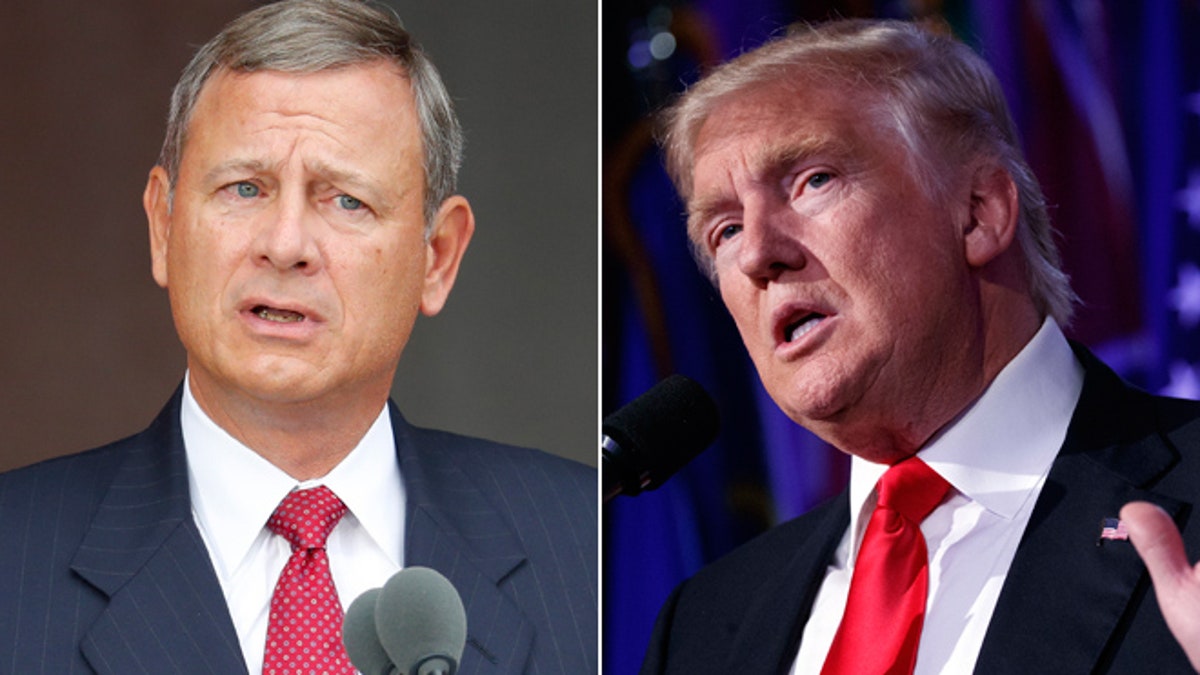
Pictured here is Chief Justice John Roberts, left, and President-elect Donald Trump, right. (AP)
Chief Justice John Roberts will have only 35 words to say to President-elect Donald Trump on Inauguration Day when administering the official oath of office. Any further chitchat may be awkwardly brief, given the GOP nominee has publicly called the nation's highest jurist "an absolute disaster"-- and worse.
Such is politics, but both men, whether they will admit or not, will indirectly depend on the other to preserve key components of their power and prestige.
That is because of the unfolding drama to commence in Trump's first days in office: filling the current vacancy on the Supreme Court.
It is one of the few times the highest levels of the three branches collide in a political fight that typically lasts only weeks, but whose effects can ripple for decades. A nominee is chosen by the president, then confirmed by the Senate. Once she or he takes the judicial oath, however, all bets are off-- now free to decide cases from any political or personal allegiance.
"The judicial branch will be an important check in the next few years. And I think there might be conservative justices put on the bench who are more traditionally conservative and not as authoritarian perhaps as a President Trump might be," Elizabeth Wydra, president of the progressive Constitutional Accountability Center said FoxNews.com. "And they can serve as a check, especially if there are threats to constitutional structure."
Maybe that is what worries Trump and his conservative brethren-- they may believe Roberts has not been someone you can take for granted, and would vote a certain way every time. This despite the chief justice being nominated by President George W. Bush and having an 11-year reliably conservative record. Replacing Scalia with another conservative will likely not shift the balance of the court and its shaky right-leaning majority in the short term. But the next vacancies-- whether possibly Justices Ruth Bader Ginsburg, Anthony Kennedy, or Stephen Breyer, all in their late 70s or 80s-- have the potential to be game changers.
If and until then, having Roberts lead the conservative charge will be to Trump's advantage, regardless of the president-elect's insults.
The chief justice for his part has not responded to Trump, and given his steady, low-key leadership under both Republican and Democratic presidents, the 61-year-old Roberts is unlikely to care much what is said about him personally. Life tenure on the bench gives you that security.
Court of Public Opinion
But what colleagues close to Roberts say he does care about is political attacks on the court as an institution and its role as a fair arbiter of the rule of law. Credibility and legitimacy matter.
The "chief," as he is informally known around the court, has publicly stated his long-term efforts to forge consensus with his colleagues whenever possible, show respect for precedent, and to preserve the court's reputation.
In a 2014 speech, he noted the "partisan rancor" in Congress "impedes their ability to carry out their functions. “I don't want this to spill over and affect us. That's not the way we do business."
The public mostly agrees. A Gallup poll in September found 61-percent of Americans surveyed have a great deal or fair amount of trust and confidence in the Supreme Court, far higher than the other two political branches. That number has remained roughly consistent the past five years.
But Trump has been more blunt, taking a results-oriented consistency when judging the judges.
In particular, Roberts' dramatic 2012 deciding vote upholding the key funding provision of the Affordable Care Act-- saving President Obama's signature domestic achievement.
Conservatives called it a calculated act of betrayal, a narrative Trump was all too eager to exploit on the campaign trail.
"Justice Roberts really let us down," Trump said at a campaign rally last December. "What he did with Obamacare was disgraceful, and I think he did that because he wanted to be popular inside the Beltway."
In other speeches, Trump used words like "disappointment," and a "nightmare." He has cited Scalia and Justice Clarence Thomas as his favorites.
With that template, the new president has publicly named 21 individuals-- all but one a state or federal judge-- from whom he has vowed to select his Supreme Court nominee. Trump has promised that person will be a reliable conservative, someone opposed to abortion rights and "very pro-Second Amendment."
Roberts Role
The Chief Justice of the United States-- that's the official title-- has administrative control over the entire federal judiciary and the 866 or so appeal and district court judges, along with bankruptcy and magistrate judges. So filling those little-noticed vacancies with conservatives in the Trump mold would ostensibly have the greatest influence on the broader rule of law.
"These are the courts that actually decide the vast majority of litigation in the United States," Thomas Dupree, a former Bush 43 Justice Department official, and a top appellate attorney. "So when we look ahead to the next four, possibly eight years, President Trump is going to have a massive impact on the judiciary."
Those judges would tackle day-to-day issues like executive power, immigration, environment, and criminal procedure-- and of course hot-button social issues like abortion, marriage equality, and legalizing marijuana.
And since the Supreme Court only takes up about one-percent of the appeals presented to them for full review, the lower courts will largely determine whether significant parts of the Trump agenda survive judicial scrutiny. And since the high court gets the final word-- the president can only hope Roberts-- and Kennedy to some extent-- stick with fellow conservatives.
Some liberal activists hold out tenuous hope Roberts takes a more active role as a "swing" vote-- now occupied almost exclusively by Kennedy-- but there is little immediate evidence he will drift left with abandon. Roberts wrote the dissent last year when the court struck down state laws banning same-sex marriage. He said the 5-4 majority's conclusion-- authored by Kennedy-- of a nationwide right guaranteed by equal protection and due process, was misguided.
In language many social conservatives applauded, Roberts said the opinion was about political will, not legal judgment.
“The court invalidates the marriage laws of more than half the states and orders the transformation of a social institution that has formed the basis of human society for millennia," he said. "Just who do we think we are?"
This past spring he was firmly in the conservative camp in two high-profile cases: on the losing side when Texas' restrictions on abortion clinic access were tossed out as overly burdensome to women seeking the procedure; and prevailing when President Obama's executive action on immigration was blocked from going into effect.
Political Football
Ten days before Scalia's death in February, Roberts was unusually candid making the case courts should have a limited role, resisting the temptation to be the final arbiter of issues great and small.
And he offered a prescient warning of sorts of the effects a partisan fight over filling the pending and future Supreme Court vacancies can have.
"We don't work as Democrats or Republicans, and I think it's a very unfortunate perception that the public might get from the confirmation process," he said. "When you have a sharply political divisive hearing process, it increases the danger that whoever comes out of it will be viewed in those terms," he said.
Then Roberts indirectly addressed suggestions then roiling in the presidential primaries that he and the court were engaging in "judicial activism'-- the ultimate dis.
"If we uphold a particular political decision, that remains the decision of the political branches, and the fact that it may lead to criticism of us is often a mistake," he said. "We do have to be above or apart from the criticism because we, of course, make unpopular decisions-- very unpopular decisions."




